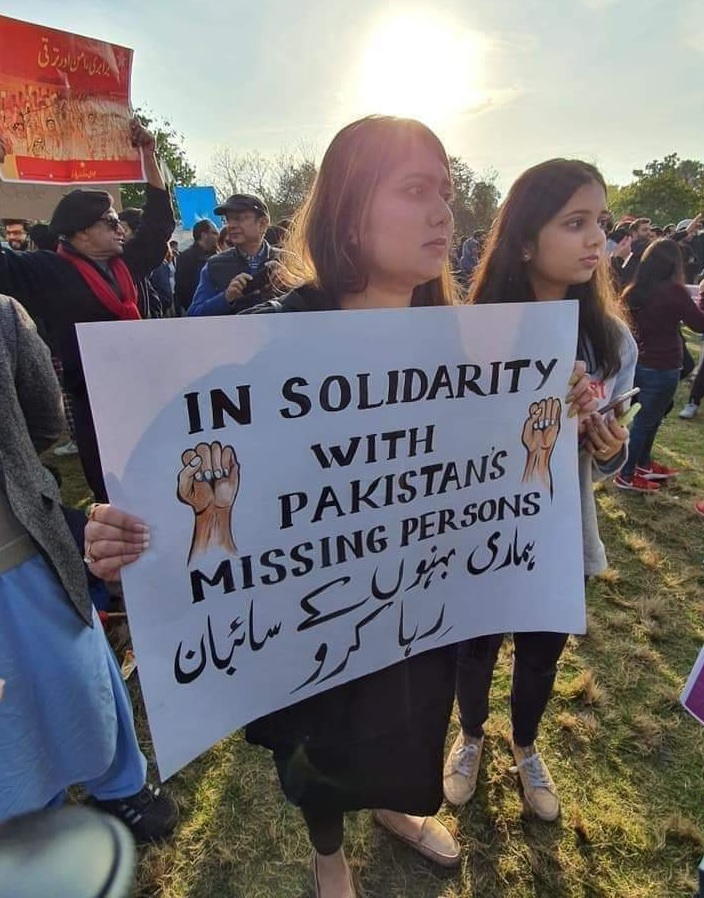Karima Baloch, the slain Baloch nationalist who grabbed headlines after her murder in Canada last year, was the inspiring spirit driving the Aurat Azadi March – an annual event in Pakistan, marking International Women's Day on Monday. Thousands of women filled the streets in various major cities of Pakistan today, including capital Islamabad, amplifying recorded cases of sexual crimes, domestic violence and worse. Angry women marchers demanded gender-sensitisation of all medico-legal officers – and banning of the archaic two-finger virginity test – plus reduction in the defence budget, using it instead for the purpose of healthcare allocation.
Significantly, the Aurat Azadi March called for an end to enforced disappearances in the entire country and deliverance of justice for the likes of Karima Baloch, Malik Naz and several other Balochs.
Karima, the 37-year-old Baloch activist, was found mysteriously drowned at the Harbourfront waters in Canada's Toronto on December 21. As reported by India Narrative last year, massive protests had erupted in and around the Turbat town of Makran in Balochistan after state-sponsored ‘death squads’ shot dead a woman named Malik Naz and seriously wounded her four-year-old daughter Bramsh Baloch on May 26, 2020.
In a first, the Islamabad chapter of Aurat Azadi March asked for an end to ongoing murders, the overall victimization of women political workers and an immediate halt of military operations in Balochistan and Khyber-Pakhtunkhwa. It asked the Imran Khan government to abolish draconian policies of the state that have subjected countless families to violence and subjugation due to the use of colonial and coercive instruments such as ‘collective punishment’, internment centers, and various laws.

This year's Aurat March also demanded demilitarization and desecuritization of campuses across Pakistan, and removal of paramilitary forces from educational institutions, especially in Balochistan and Sindh.
"This day has has a different meaning and a different message and also a different essence for the Baloch Women who in great numbers are waiting for their loved ones who have been disappeared by State. #AuratMarch2021 has made Missing Persons a part of it is welcomed," tweeted Mohammad Ali Talpur who has been associated with the Baloch Freedom Movement for decades now.
Pakistan continues to remain one of the most dangerous countries in the world for women and also in terms of gender equality. The country ranks third-to-last (151st) on the 2020 Global Gender Gap Index released by World Economic Forum, having closed only 56 per cent of the gender gap. According to the report, Pakistan ranks in the bottom 10 in three of the four main categories of the index and below the 100th mark in 12 of the 14 individual indicators composing the index. The gap remains cavernous in terms of economic participation and opportunities (32.7, 150th).
While a majority of countries have bridged or nearly bridged the educational gender gap, Pakistan’s still stands at almost 20 per cent. Less than half of women are literate, compared with 71 per cent of men, while the share of women enrolled is systematically lower than the share of men across primary, secondary and tertiary education.
Started in 2018, the mission of the Aurat March is to unite women, trans and non-binary people for the cause of gender justice and bring about collective social change based on the principles of inclusion, dignity, freedom and equality. The dharna will raise voices on diverse issues affecting women, trans and non-binary people from all backgrounds. We express solidarity for the connected nature of our struggles and work together to dismantle systems of oppression and exploitation. We must create a society in which women, trans and non-binary people of all ethnic backgrounds and religious communities, from the working class, refugees and those displaced, and those with disabilities, are free and able to care for themselves and their families.
The European Parliament had last year expressed concerns in the light of the alarming statistics on discrimination and violence against women. Quoting figures from NGO White Ribbon Pakistan, the Parliament members had highlighted Pakistan government's failure to protect women as incidents of honour crimes, sexual violence, domestic violence and kidnappings of women continued to rise.
In September, several members of the European Parliament had also demanded an explanation from Josep Borrell, the current High Representative of the European Union, after the Lahore motorway gang rape case in which a woman was sexually assaulted in front of her children. The horrendous case happened not long after a five year old girl in Karachi was raped and then set on fire.
Besides asking Borrell to condemn the case, in which the Lahore Capital City Police Officer (CCPO) had victim-blamed the women stirring huge public outcry and rage, the EU Parliamentarians also said that any current and future engagement plans with Pakistan should be based on the promotion of women’s rights and the elimination of all forms of violence against women. They also wanted to make all funding programmes with Pakistan conditional on the basis of advancement of women's rights through gender mainstreaming as one of its funding objectives.
Responding on November 16, Borrell said that the Commission had been urging Pakistan to effectively implement the 27 international conventions under the special incentive arrangement for sustainable development and good governance (GSP+) and also includes action to tackle the impunity for the perpetrators of crimes, and the implementation of gender equality policies.
As thousands marched on the streets of Islamabad, Lahore, Karachi, Multan and several other cities of Pakistan on Monday, they demanded not only restructuring of the police department but also "male-dominated" institutions such as the Pakistan Electronic Media Regulatory Authority (PEMRA) and the Pakistan Telecommunication Authority (PTA).





















